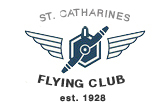The St. Catharines Flying Club is registered as a Career College under the Career Colleges Act,2005 and approved as a vocational program under the Career Colleges Act, 2005 to provide Instructor Rating and Commercial Pilot training.
Successful completion of the Commercial Pilot Program through the St. Catharines Flying Club leads to eligibility for Commercial Pilot License (Aeroplane Category) issued by Transport Canada and the issuance of a Certificate of Qualification—Commercial Pilot. The holder of a Commercial Pilot License may exercise the privileges of Pilot-in-Command of any aircraft engaged in a commercial air services.
Commercial Pilot training is composed of ground school and flight training instruction. The ground school is designed to prepare students for the knowledge requirements for the Commercial Pilot Licence, as the criteria which is established by Transport Canada for the written examination. Flight training instruction is crafted to prepare students for the skill required to obtain a commercial licence for demonstration on the Transport Canada Commercial Pilot flight test.
Last, in accordance with the International Civil Aviation Organization, all pilots must demonstrate English language proficiency.
PREREQUISITES
The minimum age for a Commercial Pilot License is eighteen years of age. Before commencing training in the Commercial Pilot Program, you will require a valid Private Pilot Licence—Aeroplane Category, and a valid Category 1 Medical Certificate which you may choose to receive from the St. Catharines Flying Club or you may have obtained the Private Pilot Licence from any other source prior to enrolling in the Commercial Flight Training program at the St. Catharines Flying Club. In accordance with the requirements established by the Private Career Colleges Act, 2005, to provide Instructor Rating and Commercial Pilot training, entrance into this program requires the completion of Grade 12 (or equivalent) or candidates must qualify as a mature student (age 19 and not having attended school full-time for 52 weeks).
MINIMUM REQUIREMENTS FOR COMMERCIAL PILOT LICENCE
See Transport Canada for the full list of minimum requirements in order to obtain your Commercial Pilot Licence. Below is an overview:
- 200 hours flight-time experience, including 100 as Pilot-in-Command, 20 hours cross-country Pilot-in-Command.
- 65 hours flight training in the aircraft category (ie: aeroplane or helicopter), including no less than 35 hours dual with a flight instructor, plus 30 hours solo.
- Of the 35 hours of dual flight, 5 hours must be night (including 2-hour night cross-country), and 20 hours must be instrument time (flight by reference only to flight instruments); a maximum of 10 hours instrument simulator time may be credited toward the 20 hours instrument time required.
- Of the 30 hours solo flight time emphasizing improvement in flying skills, there must be a cross-country flight to a point not less than 300 nautical miles from the point of departure, with 3 full-stop landings. The 30 solo hours must also include 5 hours by night and completion of 10 circuits.
SEXUAL VIOLENCE AND HARRASSMENT POLICY
PREAMBLE
St. Catharines Flying Club (SCFC) is committed to providing a safe and healthy environment for Ontario Career Colleges students, other students, staff, club members and visitors alike. As such, any behavior which jeopardizes or threatens such an environment will not be tolerated and this includes any form of sexual violence and harassment.
For the purposes of this policy, sexual violence means any sexual act or act targeting a person’s sexuality, gender identity or gender expression, whether the act is physical or psychological in nature, that is committed, threatened or attempted against a person without the person’s consent, and includes sexual assault, sexual harassment, stalking, indecent exposure, voyeurism and sexual exploitation.
RESOURCES AND SUPPORT
Victims of sexual violence in any form are not required to file a report or a complaint in order to avail themselves of support services, although assistance with preparing and filing such reports will be provided if and when requested. Local resources are listed below:
Niagara Region Sexual Assault Centre, CARSA Inc.
Landmark Building, 43 Church Street, Suite 503
St. Catharines, Ontario L2R 7E1
Office Telephone 905 682-7258
Crisis Telephone 905 682-4584
Website www.sexualassaultniagara.org
Niagara Regional Police
Sexual Assault Unit
Telephone: 905 688-4111
Niagara Health Sexual Assault Domestic Violence Treatment Programme
St. Catharines Hospital Emergency Department
1200 Fourth Avenue
St. Catharines, Ontario L2S 0A9
Telephone 905 378-4647 ext 45300
Brock Student Sexual Violence Support Centre
31 Ontario Street
St. Catharines, Ontario L2R 5J3
Telephone 905 397-7671
Text 24 hrs 289 990-7233
Website www.asaferbrock.org
Assaulted Women’s Helpline
Telephone 866 863-0511
Dial #SAFE (#7233) on a Bell, Rogers, Fido or Telus mobile phone
TTY for deaf or hearing-impaired 866 863-7868
Website www.awhl.org
SCFC’s Health and Safety Officer, Reinaldo Lopes, is available to provide support, references to local services and, where practicable, accommodation or transportation for victims of sexual violence. Mr. Lopes can be contacted at 905 684-9447.
Any persons who are affected by any incidence of sexual violence are entitled to avail themselves of the support services listed above whether or not they choose to file a report or complaint.
REPORTING AND RESPONDING
Any persons who are affected by any incidence of sexual violence may, at their sole discretion, file a report or make a written complaint about such incident. The report/complaint may be made directly to the SCFC’s Health and Safety Officer, Reinaldo Lopes at 905 684-9447 or through any of the above-listed support groups, including the Niagara Regional Police.
SCFC recognizes the right of the complainant to determine how his/her complaint will be dealt with. However, in certain circumstances, SCFC may be required by law or internal policies to initiate an internal investigation and/or inform outside authorities without the complainant’s consent if it is believed that the safety of any individual within the auspices of SCFC or the broader community may be at risk.
SCFC staff will co-operate fully in any resulting investigation and, if reported directly, will initiate its own internal investigation. The privacy and security of the parties involved will be protected as fully as possible within the confines of the investigation. Such investigation should include interviews with the complainant, the accused and all witnesses to the alleged violence. Each and every individual involved in any way in the investigation shall be entitled to have a person present with him or her at every stage of the process.
The victim of the alleged incidence of sexual violence may choose not to request an investigation, and has the right not to participate in any investigation which may occur.
All information disclosed during the course of the investigation shall be maintained confidential within the confines of the various parties involved, including but not limited to, the Health and Safety Officer, the complainant, the accused, the witnesses and the parties in attendance at the request of the aforementioned individuals. Disclosure to any other outside parties will be made only with the written consent of the complainant, the accused and the SCFC representative unless required by law or external policy.
INVESTIGATIONS AND SUBSEQUENT MEASURES
A complaint of sexual violence may be filed under this policy, in writing, by any Ontario Career College student, instructor or staff member to the Health and Safety Officer.
Upon receipt of a complaint of alleged sexual violence, the Health and Safety Officer will initiate an investigation, including, but not limited to the following:
Determining if the incident should be referred immediately to the police;
Determining any interim measures which should be taken immediately;
Meet with the complainant to determine the date and time of the incident, the persons involved, the names of witnesses and a detailed description of the incident;
Interview the complainant, all witnesses and any other persons who may have knowledge of the alleged incident(s);
Inform the respondent of the complaint, providing all known details and allowing the respondent to respond to the allegations;
Provide reasonable updates to all interested parties;
Determine what subsequent measures, if any, should be taken.
If it is determined that an Ontario Career College student or staff member has been involved in sexual violence, immediate disciplinary or corrective action will be taken, up to and including termination of employment of instructors or staff, or expulsion of a student.
APPEAL
Once a decision on the matter is rendered, the decision may be appealed by any of the complainant, the accused or SCFC through any one of the bodies listed above and the decision may be subject to review.
If students, in good faith, report an incident of, or make a complaint about, sexual violence, they will not be subject to discipline or sanctions for violations of the private career college’s policies relating to drug or alcohol use at the time the alleged sexual violence occurred.
Students who disclose their experience of sexual violence through reporting an incident of, making a complaint about, or accessing supports and services for sexual violence, will not be asked irrelevant questions during the investigation process by the career college’s staff or investigators, including irrelevant questions relating to the student’s sexual expression or past sexual history.
FALSE STATEMENTS AND REPRISAL
Making a false report or complaint of sexual violence or providing false information during the investigative process will not be tolerated, and individuals who are found to have provided false information will be subject to disciplinary and/or corrective action, up to and including termination of employment of a staff member or expulsion of a student.
Any steps taken to retaliate or threaten to retaliate against any party involved in the complaint and/or interview process will not be tolerated and may be subject to disciplinary and/or corrective action as stated above.
TRAINING
A copy of this policy will be provided to each career college student at the time that the student’s contract is accepted by SCFC.
This policy document will be made available in electronic or printed form to all staff, instructors, members and directors of SCFC.
REVIEW AND DATA COLLECTION
This policy will be reviewed every five years or more frequently if required by changes the Ontario Career Colleges Act, 2005 or other regulatory authority.
SCFC will collect data and statistics which may be provided upon request by the Superintendent of Ontario Career Colleges.

